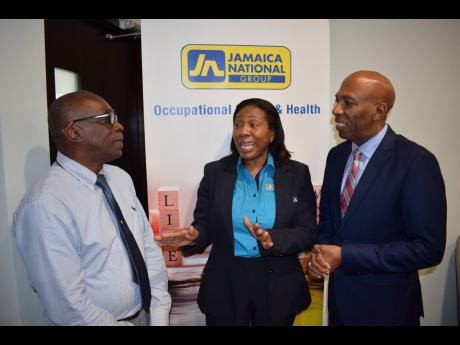Growth & Jobs | Negative thinking stifles success in the workplace – Abel
One of Jamaica’s most leading psychiatrists and therapists, Dr Wendel Abel, is urging persons to develop the habit of positive thinking as part of achieving good mental health and success in the workplace.
Dr Abel was addressing members of the JN Group occupational health and safety team and other employees of the Jamaica National Group during a presentation on Mental Health in the Workplace, held at the JN Fund Managers headquarters recently.
“When we speak about good mental health, we are talking about positive self-worth, coping with stress, realisation of your full potential, being able to do work productively,” Dr Abel explained.
“Negative thoughts affect our performance. Negative thoughts prevent us from seeing our true potential. What stands between you and success are negative thoughts,” he declared.
Dr Abel pointed out that harbouring negative thoughts about the future can affect how one feels on a daily basis, and his or her interaction with others; as well as his or her ability to manage stress. He further said persons often seek to magnify the negatives while minimising the positive things around them.
“We have to police these negative ways of thinking,” he emphasised. He stressed that good mental health encapsulates having positive self-worth.
However, he noted that in our culture, persons perceive self-affirmation as boasting.
“We have been brought up not to talk positively about ourselves because it is boasting. There’s a difference between that and learning to affirm yourself. We must be positive about ourselves. Positive affirmation makes a difference in our lives, and what you affirm becomes your reality.”
Highlighting the high incidence of persons with mental health issues, he pointed out that one in four persons struggle with a mental disorder, while 50 per cent of cases go untreated.
Reality of stigma
“Part of the reason people don’t get treated is because of the stigma and lack of access to healthcare. We live in a society where ignorance is the cause of stigma. Some persons still believe that mental illness is demon possession, witchcraft and obeah. They are also fearful of going to a psychiatrist,” he outlined.
Janice Green, president of the Jamaica Occupational Health and Safety Professionals Association and occupational health and safety officer at The Jamaica National Group shares Dr Abel’s sentiments. She added that negative thinking can lead to maladaptive or self-destructive behaviours which can have a ripple effect on performance and productivity.
“A depressed or anxious employee at work does not operate in a ‘bubble’ , but is usually part of a bigger team. On a relay team, if one member of the team is not operating at optimum, it affects the other members, who have to invest more energy to make up for the deficiency, and this sometimes affects the team’s performance,” she explained.
Noting that no one is immune from mental health issues, Green pointed out that employees can maintain good mental health by accepting their limitations and acknowledge that they are capable of being “burnt out”.
“De-stress, relax, have fun, eat healthy, get enough sleep, live simple and within your financial capabilities,” she advised, while urging employees to be sensitive to the emotional responses or feelings of others.
Employers Can Play a part
She also stated that employers can play a part in helping employees to achieve good mental health balance.
“Match employees’ skills and talents to the right job, to prevent overload. Get the right fit for the job from the onset.
Be sensitive to employees, who may require time off to treat with a mental imbalance. Sick days are not only for physical illnesses, but also include mental wellness treatment.”
Green further added that employers can institute an employee assistance programme in which employees can have access to private and confidential facilities, with trained psychologists.
“This coping skills facility should be extended to employees’ immediate family members; and, as much as possible, to be free of cost to the employees,” she recommends.


